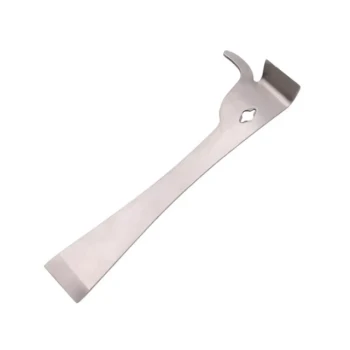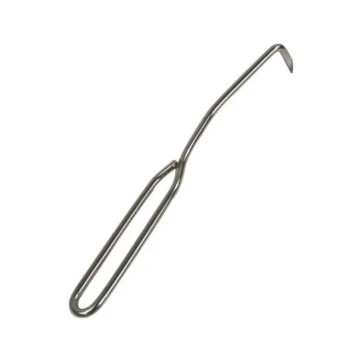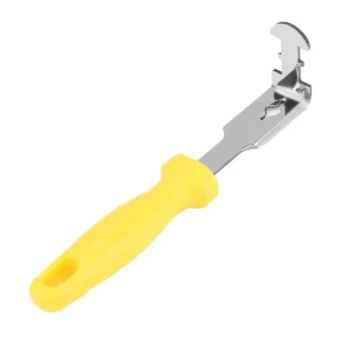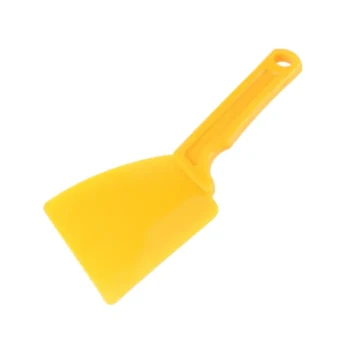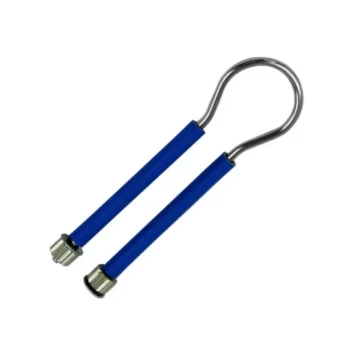Understanding bee robbing is about recognizing a perfect storm of opportunity and desperation. The potential for robbing increases dramatically when specific environmental and colony conditions align. These primarily include a nectar dearth following a major nectar flow, the presence of large colonies with an idle forager force, warm temperatures suitable for flight, and the existence of weak or stressed nearby colonies that are unable to defend themselves.
Bee robbing is not an act of malice, but a survival strategy driven by scarcity. It occurs when strong, populous colonies are faced with a sudden lack of floral resources and discover they can more easily overpower a weaker neighbor to steal their winter stores.
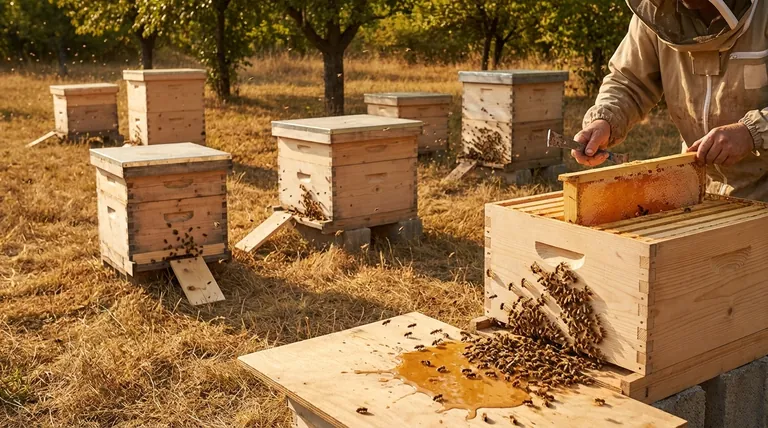
The Core Triggers of Robbing Behavior
Robbing is a complex behavior initiated by a combination of factors. When a beekeeper understands these individual components, they can better anticipate and prevent robbing events in their own apiary.
The Catalyst: A Sudden Nectar Dearth
A nectar dearth is the single most important trigger for robbing. This is a period when few or no plants are producing nectar for bees to collect.
These dearths are most common in late summer and fall, immediately after the major summer honey flow has ended. The colony's large, experienced foraging force suddenly has no natural food source, but is still highly motivated to find one.
The Aggressor: Strong Colonies with Idle Foragers
Ironically, the strongest colonies in the apiary are almost always the perpetrators of robbing. A hive bursting with bees, especially a high proportion of experienced foragers, has an immense daily need for resources.
When natural nectar disappears, this massive workforce doesn't simply stop working. They begin actively searching for any available source of carbohydrates, and a less-defended hive is an incredibly rich target.
The Victim: Weak and Vulnerable Colonies
Robber bees are opportunistic; they seek the path of least resistance. A weak colony is the perfect target because it lacks the population to mount an effective defense.
Colonies can be weakened by many factors, including a failing queen, disease, or high Varroa mite loads. These colonies have fewer guard bees at the entrance and often emit stress-related pheromones that can signal their vulnerability to nearby foragers.
The Enabler: Favorable Weather
Robbing is an intense, energy-demanding activity. It requires warm, sunny weather that allows for maximum flight activity.
Bees will not typically engage in widespread robbing on cool, rainy, or windy days. The peak risk for robbing occurs on hot, dry afternoons during a nectar dearth.
Common Beekeeper Mistakes That Encourage Robbing
While environmental conditions set the stage, beekeeper actions can inadvertently trigger or worsen robbing events. Understanding these common pitfalls is critical for prevention.
Spilling Food Sources
Spilling sugar syrup or honey near the hives is one of the fastest ways to incite a robbing frenzy. Even small amounts can attract scout bees, who will then recruit others and begin frantically searching for the source, often leading them to the entrance of a weaker hive.
Performing Careless Inspections
Opening a hive during a dearth is a calculated risk. If a hive is left open for too long, or if frames of honey are left exposed, the scent will quickly attract robbers from across the apiary. Quick, efficient inspections are essential during high-risk periods.
Leaving Entrances Unprotected
A wide-open entrance is easy for foraging bees to enter during a nectar flow, but it becomes a defensive liability during a dearth. A weak colony cannot adequately guard a large entrance, making it an open door for invaders.
Making the Right Choice for Your Goal
Your management strategy should adapt to the seasonal risks and the specific state of your colonies.
- If your primary focus is protecting weak or small colonies: Your absolute priority is defense. Drastically reduce their entrance size and consider installing a robbing screen to confuse invading bees.
- If your primary focus is managing strong, populous colonies: Ensure they do not become the aggressors. If you must feed, do so internally and in a way that minimizes spills and excitement, preferably in the evening when most bees have stopped flying.
- If your primary focus is general apiary management in late summer: Practice impeccable hive hygiene. Work quickly, never leave honey or syrup exposed, and be vigilant for the first signs of fighting at hive entrances.
By understanding these triggers, you can shift from reacting to robbing events to proactively managing a more peaceful and productive apiary.
Summary Table:
| Condition | Role in Robbing | Key Insight |
|---|---|---|
| Nectar Dearth | Primary Catalyst | Creates scarcity, forcing strong colonies to seek alternative food sources. |
| Strong Colonies | The Aggressor | Idle foragers from populous hives become desperate and opportunistic. |
| Weak Colonies | The Victim | Poor health or small populations make hives easy targets for invasion. |
| Warm, Dry Weather | The Enabler | Ideal flight conditions allow for intense robbing activity. |
Protect Your Investment and Ensure Apiary Harmony
Robbing can lead to significant losses, wiping out weak colonies and spreading disease. Don't leave your hives vulnerable. The right equipment is your first line of defense.
HONESTBEE supplies commercial apiaries and beekeeping equipment distributors with the durable, effective tools needed for proactive hive management. From robbing screens to internal feeders, our wholesale-focused operations provide the reliable supplies that protect your colonies.
Let us help you build a stronger, more secure apiary.
➡️ Contact HONESTBEE today for a quote and ensure your beekeeping operation is equipped for success.
Visual Guide
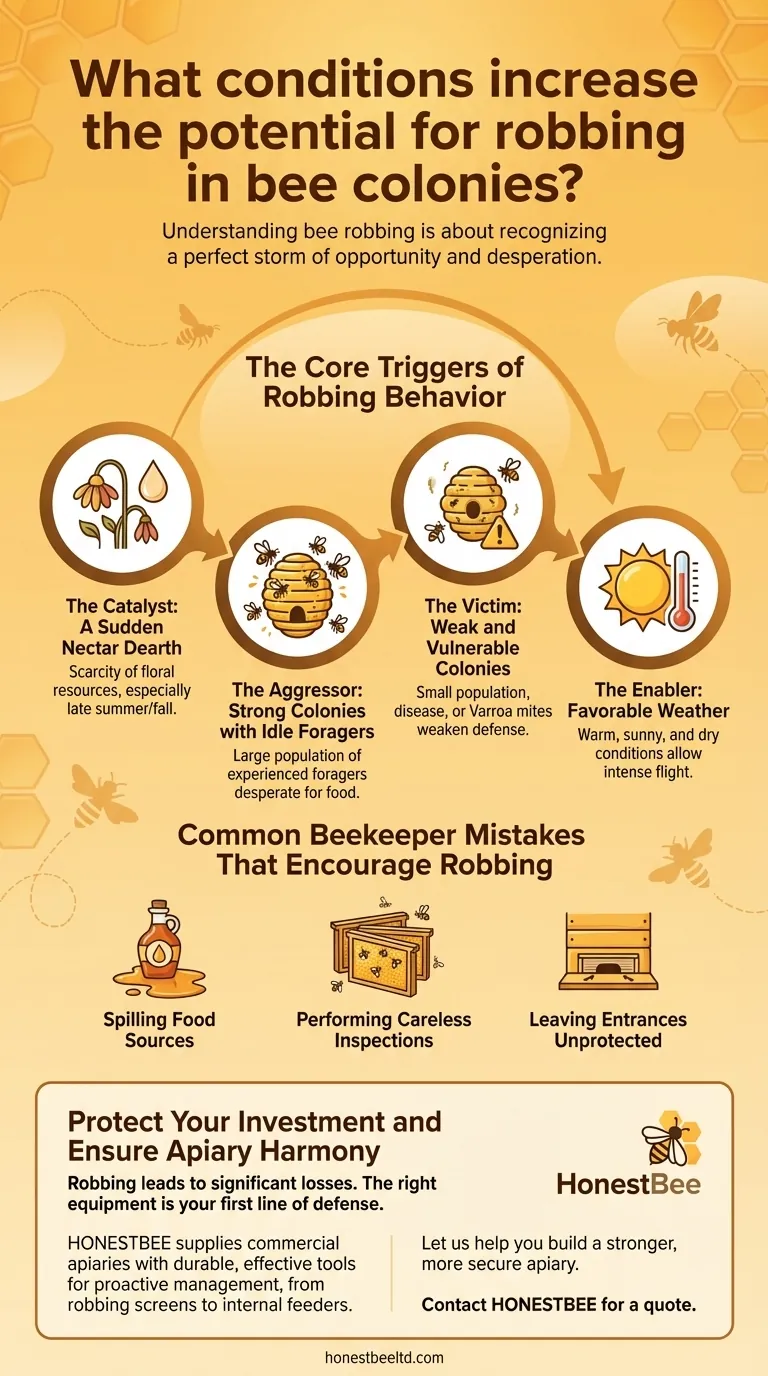
Related Products
- Wholesales Dadant Size Wooden Bee Hives for Beekeeping
- Professional Multi-Function Stainless Steel Hive Tool
- Professional Insulated Plastic Bee Hives
- Honey Flow Garden Bee Hive Flow Hive Best Beehive for Beginners
- Langstroth Bee Hives Bee Keeping Box for Beginners Beekeeping
People Also Ask
- How should new wooden beekeeping equipment be prepared for use? Pro Tips for Maximum Hive Durability
- What is the best place to keep bees? Find the Perfect Apiary Site for Your Hives
- Why are oak or pine woods preferred for artificial beehives? Discover why these materials optimize colony health
- How does the use of industrial hive-making machinery support ecological balance? Precision for Urban Beekeeping
- What components are typically included in a wooden beehive set? A Complete Guide to Professional Hive Structures

